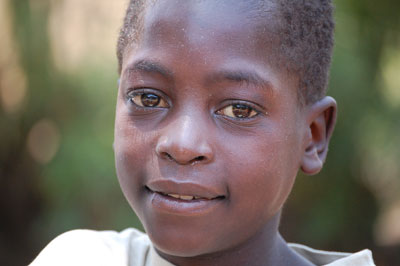Blantyre, Malawi -- They warned me about this.
They said to be careful, to not get too close, to not let "it" get to me, to not become overwhelmed or "too emotional."
After about three weeks of behaving myself and keeping my head and heart in check while traveling through east Africa, I did exactly what they said not to do.
I fell in love. Hopelessly, helplessly, achingly in love.
His name is Vasco. He's 10. It was love at first sight on my part, though I can't speak for the Malawian child who has broken my heart with his.
As he sat on my lap and leaned his narrow back into my chest, I could feel his heart thumping hard -- much too hard for a boy who was sitting still and hadn't been running around. Each beat of Vasco's heart shook his slight body so intensely that I could see a bulge on the left side of his narrow chest moving under the shirt he wore, the one with the word "chisomo" on it.
At 10, he's the size of an average American six-year-old and weighs about half of what the suitcase I've been lugging around Africa does.
I met Vasco when his caseworker, Mac, from a philanthropy in Blantyre that works with the city's many street children, took me to the outskirts of town to meet the little boy with the broken heart.
While we don't yet know precisely what Vasco's medical diagnosis is -- basic health care for the very poor here is difficult at best, and treatment for specialized cases (such as pediatric cardiology) is even more so -- Mac and Vasco's aunt, Esme, said the little guy has an enlarged heart with a hole in it. Last week, a doctor in Blantyre said that, while more tests are being done, he thinks Vasco needs lifesaving surgery -- and soon, according to Mac.
Vasco pants when he walks and sweats in the shade. He doesn't complain and tries to keep up. He loves soccer but can only watch. He smiles a shy smile, but I got the feeling it was more for my benefit than anything else. Orphans like Vasco get used to having their picture taken and smiling for strangers in a strange land who might lift them out of poverty.
A few years ago, Vasco's mother and father died of AIDS, and like so many children in this part of the world, he ended up living on the streets of Blantyre. That's where someone found him and took him to the philanthropy that works with street children, sheltering and feeding them until they are able to place them with extended family.
After months of searching, when Mac found Vasco's aunt and uncle, the boy went to live with them. They take good care of him with their limited resources.
When I visited the family, Vasco's aunt brought out a manila envelope from her mud and wattle hut and handed it to me. Inside was a wrinkled X-ray of Vasco's chest showing an enormous dark shadow where his oversize heart is. One of Vasco's cousins showed me a plastic baggie with his daily medication, chalky white pills smaller than aspirin.
I only had a few days in Malawi and tried to do what I could to make sure Vasco saw a doctor immediately. But things move slowly in the developing world. And then there's the problem of apathy and corruption.
When my husband and I told the director of the street children's philanthropy about our grave concerns for Vasco, he dismissed them with an emotionless "there are many children with many needs, and we can only do so much."
Mind you, this was after the director had taken us to a church service (at the fast-growing congregation where he's an elder) where, after four hours, the preacher hadn't preached yet, but the collection plate had been passed three times. When an elder announced that the budget for an upcoming celebration of the pastor's 50th birthday was $40,000 and asked people to give more, I felt sick to my stomach, got up and left.
There hadn't been a word about the poor, the sick, or the orphans standing on the corner down the block. Just the gospel of prosperity, a bless-me club for Christians consumed with the search for personal holiness.
As I leapt out of the director's fancy pickup truck back at our motel a half hour later, I basically begged him to make sure Vasco saw a doctor as soon as possible. He said, "I'll try to see what can be done."
I wanted to slug him and then beat him with my Bible.
We stopped to see Vasco on our way to the airport and heard him yell, "I'm coming!" (in Chichewa, Malawi's national language) from the hut where he sleeps.
"Don't run!" Mac, my husband and I shouted in unison.
Vasco climbed into my lap, his rabbit heart thunk-thunking as he spoke softly, playing with my hands as I hugged his knobby knees.
I told him I loved him and kissed his head. I wanted to throw him in my carry-on bag and run. (He would have fit.) But I couldn't do that. I had to leave him behind.
I've never felt so helpless in my life. I can't fix his heart myself, but I can tell his story.
By the way, in Chichewa, "chisomo," the word on the T-shirt Vasco was wearing when we met, means "grace."